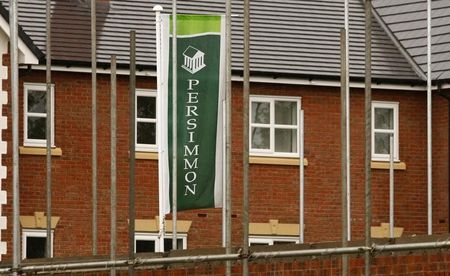By Costas Pitas
LONDON (Reuters) - Persimmon (L:PSN), Britain's biggest house builder by market value, said on Tuesday a lack of key workers was holding back the number of homes it could build, although it still expected operating profits to rise in the second half of the year.
The company said it would build almost 20 percent more homes than last year, rising to over 13,000, boosted by strong demand and helping to push up profits.
However, Chief Executive Jeff Fairburn told Reuters the lack of key skills including joinery and bricklaying was holding the company back from building more.
"With the volume increases we've been achieving, it's naturally putting a strain on the trades that are available," he said.
"The turnover ... is very quick and we're struggling to put more stock on the ground."
Persimmon, which built just over 11,500 homes last year, said it had seen a 12 percent increase in forward sales to 696 million pounds for the period from 2015 onwards.
The builder is predicted to post a 2014 operating profit of 456 million pounds according to a Thomson Reuters poll of 13 analysts, which would be over a third higher than last year's 333 million pounds.
Despite buoyant results from many house builders, there are signs Britain's housing market is cooling with the monthly Nationwide survey showing price growth easing for a second month in a row on an annual basis in October.
Barratt, which built more homes than any other house builder last year, nearly doubled its profit earlier this autumn but said trends were normalising as the effect of a government mortgage guarantee scheme began to wear off.
Britain's Help to Buy scheme enables often younger buyers with good salaries but little cash in the bank to purchase a home with a smaller deposit.
Persimmon said a more traditional seasonal pattern was returning to the market with customers taking a break from house-hunting during the summer before returning in the autumn.
Shares in the firm were flat in early trade at 1,455 pence.

(Reporting by Costas Pitas, Editing by Paul Sandle and Mark Potter)
_800x533_L_1412520412.jpg)